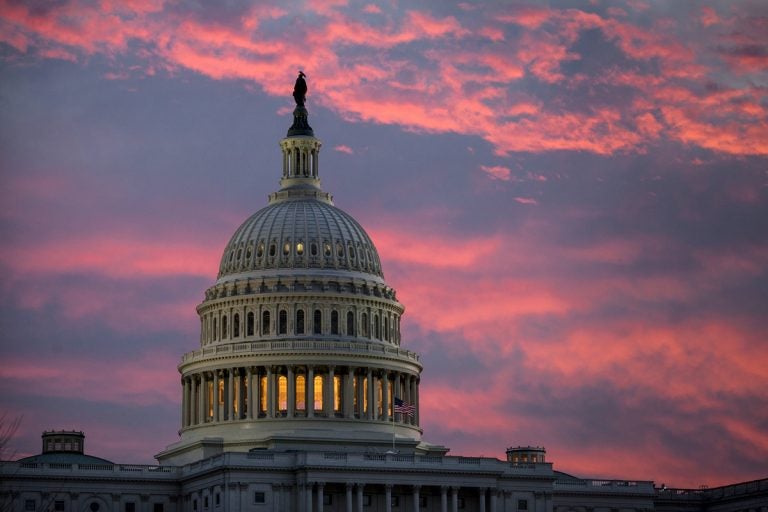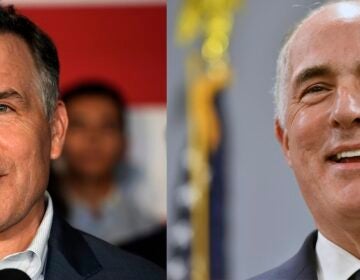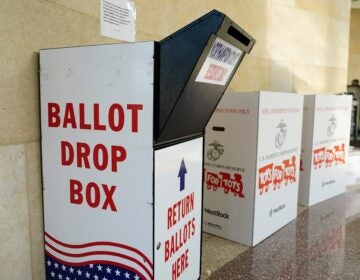U.S. House races loom largest in Pennsylvania campaign sprint
With Democrats aiming to recapture the U.S. House, Pennsylvania could be a springboard to wipe out the GOP's 23-seat majority.

The U.S. Capitol is seen at dawn in Washington, D.C., Nov. 30, 2017. (AP Photo/J. Scott Applewhite, file)
Ron DiNicola, the Democrat running in Northwestern Pennsylvania’s 16th Congressional District, isn’t trying to rewrite the message of President Donald Trump’s 2016 victory. Instead, he’s trying to harness it in his uphill battle to unseat four-term Republican Rep. Mike Kelly.
Voters in the longtime Democratic bastion of Erie County, DiNicola’s home, backed a Republican presidential candidate there for the first time in 32 years, and DiNicola sees why.
“I probably was a bit surprised at the time,” DiNicola said, “but as you reflect on it, you realize that people are really frustrated with a government that doesn’t work.”
Now, the fights for U.S. House seats being waged by DiNicola and his fellow Democrats are shaping up as the most closely watched contests in Pennsylvania, as the state’s races for governor and U.S. Senate are relegated to relative backburner status.
Campaigns are ramping up on Labor Day, as labor-endorsed candidates like DiNicola march in union-organized parades in cities across Pennsylvania. It’s also viewed by campaign strategists as a fulcrum of sorts, when persuadable voters return from summer vacations, and start paying attention and making up their minds over a nine-week sprint to the Nov. 6 election.
There is no sign that super PACs will flush millions of dollars into Pennsylvania to try to unseat Democratic Gov. Tom Wolf and Democratic U.S. Sen. Bob Casey, and no independent poll shows their Republican challengers within striking distance.
But with Democrats aiming to recapture the U.S. House, Pennsylvania could be a springboard to wipe out the GOP’s 23-seat majority.
A pickup of seats by Democrats would be unsurprising since the party of the president historically does poorly in midterm elections. But Democrats in Pennsylvania have extra reasons giving them hope of flipping as many as six seats.
Pollsters have repeatedly found that registered Democrats in Pennsylvania are more enthusiastic than Republicans about voting in November. The latest poll to find that was issued Thursday by Franklin and Marshall College in Lancaster.
Also propelling Democrats is a state Supreme Court decision in January to throw out 7-year-old congressional district boundaries as unconstitutionally gerrymandered to elect Republicans. Under that map, Republicans won 13 of Pennsylvania’s 18 U.S. House seats in three straight elections, even as Democrats dominated statewide elections during that period.
The replacement districts approved by the court’s Democratic majority are fueling more competitive contests around the state.
Freshman Republican Rep. Brian Fitzpatrick is defending his suburban Philadelphia seat in a perpetual swing district against a challenge from first-time candidate Scott Wallace. Democrats are expected to capture two other suburban Philadelphia seats being left vacant by Republicans. Just to the north, an Allentown-area seat is viewed as a tossup after seven-term Republican Rep. Charlie Dent resigned in May.
Elsewhere, three Republican incumbents — Kelly and three-term Reps. Scott Perry and Keith Rothfus — are facing what GOP strategists view as the most difficult re-election campaigns of their careers.
All three were handed more difficult district boundaries in the redrawn map.
In the heat of August, Kelly aired a TV ad designed to cement his standing with seniors.
“It was promised to you that when you were done working, you’d be taken care of. That’s why I fought to protect and preserve Medicare and Social Security,” Kelly tells a roomful of retirement-age listeners.
DiNicola called that “trying to rewrite history.” Kelly, a strong Trump supporter, also has touted Trump’s tax-cutting law as an economic good, while DiNicola criticizes it as primarily benefiting the wealthy.
Unseating Kelly won’t be easy: Had the district existed in 2016, Trump would have won it by 20 percentage points.
But DiNicola, a Marine Corps veteran and a lawyer with an Ivy League pedigree, is following a trail blazed in a nationally watched March special election when Democrat Conor Lamb flipped a Republican-held seat in a Southwestern Pennsylvania district that Trump won by nearly 20 percentage points in 2016.
Like Lamb, DiNicola avoids liberal positions that could alienate moderates. He doesn’t support California Rep. Nancy Pelosi as House Democratic leader, banning assault-style weapons or abolishing U.S. Immigration and Customs Enforcement.
And, like Lamb, he doesn’t criticize Trump. Rather, he criticizes dysfunction in Washington, its callousness to working families and what he views as Kelly’s blind allegiance to Trump.
“Anyone who is in lockstep with the president, regardless of the issue, is not serving the interests of the district,” DiNicola said. “I don’t care if he’s a Democrat or a Republican.”
WHYY is your source for fact-based, in-depth journalism and information. As a nonprofit organization, we rely on financial support from readers like you. Please give today.




